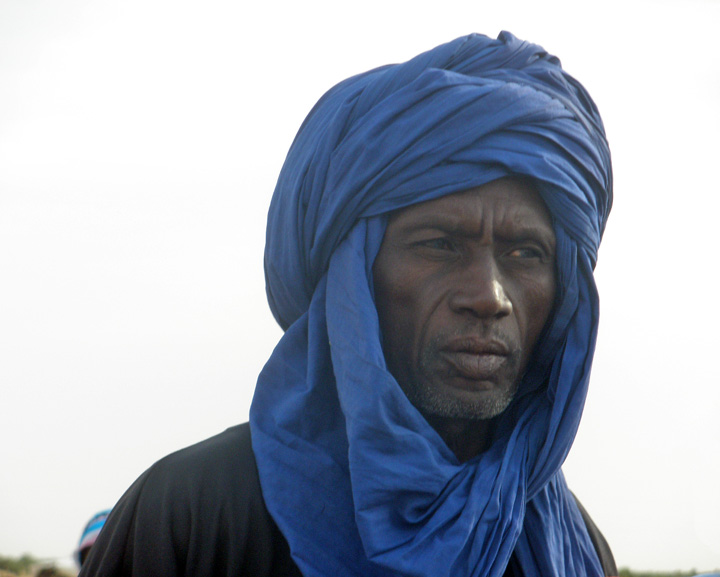

Rebuilding broken bridges in Mauritania

By M.A. Boussery
During lean periods in the Brakna region of southern Mauritania, the people of Sénékouna would leave their ancient village in search of pasture for their cattle. For one or two months they would wander, before nostalgia drove them home.
“Whenever we came back, our friendly village was intact and the homes and property that we had left behind were unharmed," says Abdoulaye Sow Mbare, the village chief. “Under the watchful eye of our immediate neighbors, a Moorish village in Medina, nobody could touch it.”
The villages -- whose leaders were foster brothers and close friends -- were ethnically and linguistically different but had developed, over time, a strong relationship of trust and good neighborliness.
So the latest homecoming was something of a shock. Repatriated from Senegal, where they had been deported after an explosion of ethnic tensions in 1989, the residents of Sénékouna found their village in ruins.
The houses were dilapidated, personal property and livestock were gone. The only source of water, an unprotected well, had become unusable. The violence and racial hatred that had swept across the country had created a climate of tension, uncertainty and animosity between the former neighbors.
Declining living conditions, rising unemployment and poverty, and the uneven distribution of resources were all exacerbating the traditional sources of conflict -- access to land and water -- and social prejudices and discrimination were rampant.
Reducing conflict in ethnic flashpoints
It was into this explosive climate that the MDG-F in 2009 launched a joint UN programme to help reduce conflict in Mauritania, improve understanding between different communities and promote human rights and the rule of law.
The programme targets areas with high potential for conflict, and focuses on vulnerable groups such as women and youth, inhabitants of adwabas (villages of former slaves) and communities of returning refugees. Its goal is not only to strengthen social cohesion, but also to assist the government in reaching the Millennium Development Goals of reducing extreme poverty and promoting women’s empowerment and gender equity.
The programme is also strengthening national capacity in conflict prevention and resolution, and helping to establish mechanisms for mediating and managing conflict situations, such as early warning networks, trained mediators and women paralegals.
One initiative involves training local politicians, religious leaders, village chiefs, women leaders and youth to help raise awareness about the potential for conflicts and to promote basic concepts of human rights and citizenship.
Building bridges through shared spaces
To help integrate different ethnic groups, the MDG-F has also built facilities for common use in 58 communities.
“The programme has given us a community market and facilities like water fountains, freezers and grain mills,” says Souleymane Ould Mahmoud, chief of the village of Medina. “We have income-generating activities that are managed by committees from the two villages, and these have built bridges of reconciliation, trust and peace between our two communities."
In addition, new classrooms and playgrounds have brought together children and youth from different backgrounds. Meeting daily in the same schools and recreational areas, this new generation is building relationships and replanting the seeds of friendship.
“Working side by side on the same common projects, shopping and gathering together in the same places have helped restore our confidence in each other and have encouraged us to resume our long-standing relations," says Abdoulaye Sow.
“Through understanding and solidarity, Sénékouna and Medina are now a single village. We’re grateful to the programme for its support, which has helped improve our living conditions and brought our two communities together,” he says.
Strengthening the rule of law
The Joint Programme “Strengthening conflict prevention capacities and the rule of law in Mauritania” is a collaboration between the Mauritanian government and four UN agencies (UNODC, UNICEF, UNDP and UNFPA) as well as NGOs and civil society organizations.
Its goal is to prevent conflicts and inter-community tensions through two main approaches: strengthening social cohesion by promoting national unity and citizenship, developing policies to more equally distribute resources, and establishing mechanisms for conflict resolution and dialogue; and strengthening the rule of law by improving capacities for conflict prevention and management.
It is part of the MDG-Fund’s effort to assist Mauritania in reaching the Millennium Development Goals of fighting poverty and hunger (MDG 1), improving universal education by introducing civic and human rights instruction into school and professional curricula (MDG 2), and increasing the involvement of women in decision-making processes (MDG 3).